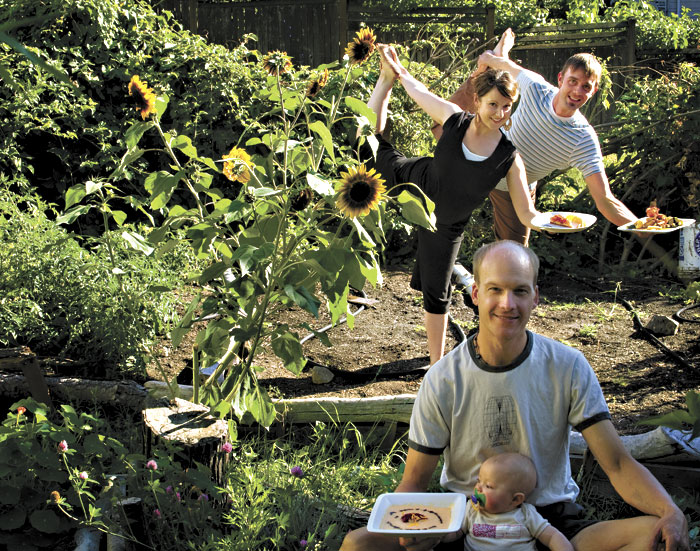Goooooooooonnnggggggg.
A friend and I were swapping malicious restaurant gossip at one of Sutra’s communal tables, taking snorts from wine glasses filled with a thick brown peach-melon puree and a fizzy pink cherry-hibiscus cooler, when chef Colin Patterson picked up a mallet and struck the brass bell over his station.
All talking stopped. Startled eyes turned. As the peal throbbed in the air, Patterson folded his slim hands together in prayer and smiled out at us. My hands lifted off my lap—an involuntary response after five years of yoga. The patrons around me, all women, had the straight backs and graceful limbs of trained yoginis, but none of them followed suit, so I quickly retrenched. “Welcome to Sutra,” Patterson announced. He read over the four-course menu listed on cards in front of us, mentioned a few tweaks that he had made since creating the menu the night before, then talked for a few minutes about his growing awareness of the connectedness of the food-supply chain. “I want to thank the farmers, thank the Earth, and thank all the hands that touched this food before it came to us,” he concluded sweetly.
Dinner had begun.
As you might deduce, Sutra is a vegetarian restaurant. A mostly vegan, mostly organic restaurant connected to a yoga studio, no less. Patterson and Amber Tande, two of Sutra’s owners, also run Rain City Yoga on Roosevelt and 50th. Earlier this year, the cafe that had taken over the old Asteroid space in Wallingford failed, and the building’s owner asked Patterson and Tande, his tenants in the house behind the restaurant, if they were interested. The couple recruited friends Aaron and Jan Geibel (Aaron had been a longtime Asteroid waiter). Even though both couples recently had had babies, they took on the project, refitting the space and establishing a garden and compost bins out back. As of July, every Wednesday through Sunday, Patterson and Aaron Geibel now serve two seatings a night of a fixed-price veggie banquet.
The partners turned the tiny room into something that feels larger. There are echoes of old-school hippiedom in the ferns hanging around the perimeter of the room and the driftwood built into the kitchen counter. New-school hippiedom is represented by two high, L-shaped tables set with backed stools—the tables make a circle with the kitchen—and ravetastic paintings hanging on the walls, which are painted a gorgeous shade between lime and olive. The kitchen and wait station aren’t large, but with only two people cooking and serving, the room remains airy.
Like many cooks specializing in higher-end vegan food, Patterson, who was executive chef of Blossoming Lotus in Kauai, likes to build up his dishes by piling flavor on flavor, claiming the world’s pantry as his own. For the first course, he hollowed out half a pattypan squash and stuffed it with chopped almonds and green chiles, added the oregano-camphor notes of nigella seeds, and served the roasted squash on a thick tomato-marjoram sauce with scattered basil leaves. For course two, he tossed peppery arugula greens with a honey-wasabi dressing that matched them punch for punch, the impact cut with cucumber slices and cherry tomatoes. On top of the greens was a tangle of brown, vermicelli-like arame dressed with soy and sesame oil.
As I was dissecting the salad, Patterson walked around the room, asking us to sniff the butterscotch melon he’d used to make our drink. “What is arame?” I asked, lifting up a strand with my fork. He explained that it was a less-common Japanese seaweed that he’d sought out for its texture.
The arame was wonderfully gelatinous, I agreed, but in general, I found texture to be a recurring weakness in the food. Take the stuffed squash, for example, which was far too raw—it needed another half-hour in the oven, at least—and stuffed with grainy, sharp-edged almonds. Flavor-wise, the third course that night was fantastic when you combined all the different layers on one fork: sesame- and coconut-breaded eggplant, roasted portobello mushrooms, spinach creamed with coconut milk, a carrot puree nutty with the flavor of curry leaves, and the sweet twang of balsamic vinegar. It was also mush on mush.
There were similar texture problems on my return a few weeks later. We started with a salad of yellow romano beans with chanterelles in a dressing of soy, yuzu juice, and truffle oil. The mushrooms had been sauteed softly and slowly, the truffle oil applied with a light touch…and the beans were raw, requiring more effort to cut and chew than most human teeth were designed for. I wasn’t a huge fan of the roasted figs and beets in the vegan lasagna—to me, their sugars jarred with the acidity of the tomato sauce—but the sauce did unite the whole-grain noodles, mixed heirloom tomatoes, and creamed spinach. Again, though: soft, soft, soft.
And again, the salad and dessert courses were the most successful. We were warned that the delicate red threads of fresh cayenne scattered over a fan of grilled peaches were spicy, and I felt them lash the walls of my mouth in passing. But their heat brought a nice finish to creamily dressed mixed greens, cool cucumber slices, and ripe fruit. Like a blueberry tart from the visit before, the pecan-spice tart in a whole-wheat crust was a Moosewood mom’s dessert. With each nutty, whole-grain bite, I could feel the collective spirit within me strengthen.
Sutra’s limited schedule and prix-fixe format are smart choices for two new dads on a budget—they only need to prep four dishes every night, with minimal food waste—but I found the food too casual for a $33 meal plus tax and tip (even pricier if you order alcohol). Patterson and Geibel may want to play with the format, especially on weekdays when most people aren’t up for a four-course splurge. Then again, I’ve eaten out with enough vegans who are thrilled to find four courses in a row they can eat to know that there’s a market in Seattle for Sutra. Had Patterson not been so earnest, and Geibel so attentive, their bell-ringing and melon-sniffing would have come off as some serious shtick. But Sutra’s cynicism-defying yogic spirit turned out to be its most appealing quality. jkauffman@seattleweekly.com






